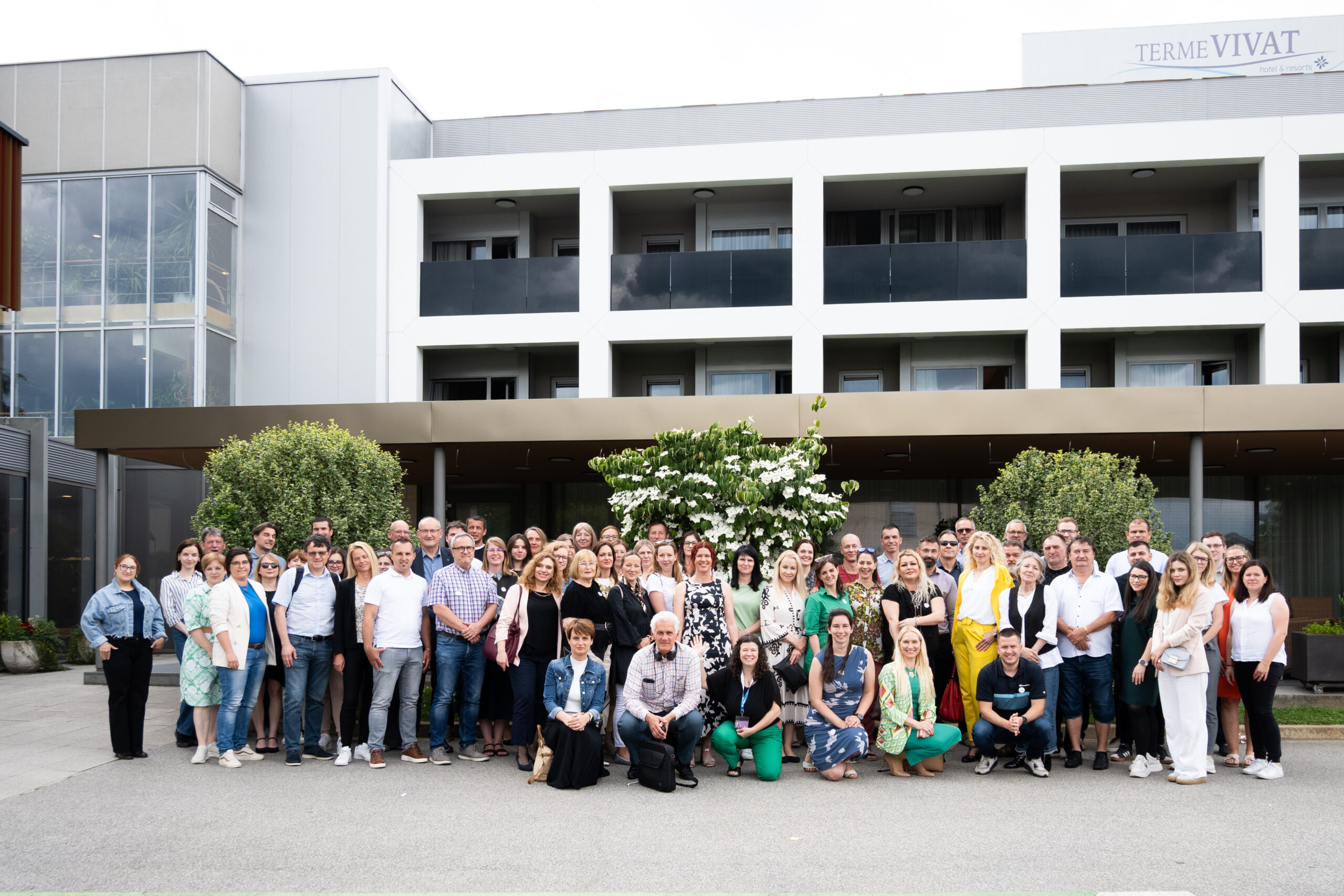An international conference entitled “Inclusive Tourism as a Development and Investment Opportunity in the Danube Region 2025” took place today in Terme Vivat. The event, organised by the Iskriva Institute in the framework of the IBC project, brought together nearly 100 experts, decision-makers, tourism practitioners, NGO representatives and educators from nine countries.
Inclusive tourism as a driver for sustainable development
Tourism is one of the key pillars of the Slovenian economy, directly contributing 5,2% of gross domestic product in 2023, returning to pre-pandemic levels. In the same year, the tourism sector employed more than 58.000 people, representing 6,3% of total employment in Slovenia.
At the same time, we face a challenge: how to ensure that tourism experiences are accessible and welcoming to everyone, regardless of age, physical ability or digital literacy. Inclusive tourism is not only a social responsibility, but also an opportunity to innovate, develop new products and broaden audiences. By ensuring accessibility and flexibility of services, Slovenia can consolidate its position as a sustainable and inclusive destination that respects the needs of all visitors.
Conference in Moravske Toplice brings together key players in inclusive tourism in the Danube Region
The opening part of the conference featured four inspiring keynote speeches. Irina Cozma from the Romanian Ministry of Development highlighted the support offered by the European Strategy for the Danube Region to social inclusion projects through tourism and culture. Urška Dolinar from Iskriva presented the development of inclusive products in the Mura-Drava-Danube Biosphere Region, and Mihael Fend told the story of the transformation of the Styria Vulcanland region into an authentic rural thermal destination. This was followed by Kristy Durso from the USA, who spoke about the culture of inclusion and her personal experience as a blind traveller and creator of Incredible Memories Travel.
Keynote speakers:
Urška Dolinar, Director of Iskriva, Slovenia
Urška Dolinar has been working for 15 years in the field of regional development in the Danube region, linking European funding with local needs. Her work is closely intertwined with the development of sustainable and inclusive tourism products in the Mura-Drava-Danube Biosphere Region, where she is co-creating the European Amazon Destination. As a committed advocate of inclusive development, she believes that tourism can improve the quality of life for both visitors and local people.
Michael Fend, Director of Styrian Thermen&Vulkanland, Austria
Michael Fend is the driving force behind the transformation of south-eastern Styria from a remote and underdeveloped region to one of the most authentic rural thermal destinations in Austria. Instead of large infrastructure projects, his vision focuses on “adding value” to local natural and cultural resources. For more than 20 years, his work has shown that tourism is not just an economic industry, but a powerful tool for raising the self-esteem of local communities and strengthening their future.
Kristy Durso, Travel Ability Insider, USA
Keynote speaker Kristy Durso from the USA, founder of Incredible Memories Travel and ambassador of the TravelAbility initiative, is a leading advocate for accessible tourism in the USA. As a wheelchair user and mother of children with disabilities, Kristy is a leading advocate for accessible tourism in the USA. Her work includes advising destinations and businesses on improving accessibility and educating about the needs of people with various disabilities.
When words become audible to all – handing over hearing loops to Pomurje healthcare institutions
Another special moment was the handover of portable inductive hearing loops to healthcare institutions in Pomurje. The donation was made possible by the Geodetic Institute of Slovenia within the CE-Spaces4All project, and the event symbolically underlines the importance of accessibility as a universal value, not only in tourism but also in everyday life.
The Humantechnik La-90 Set hearing loops were awarded to Zdravstven dom Murska Sobota, Zdravstven dom Lendava, Zdravstven dom Ljutomer, Zdravstven dom Gornja Radgona and Zdravstven dom Murska Sobota. This inductive hearing loop can be used as a table loop and as a hearing loop for a medium-sized room. It will be an excellent aid for hearing-impaired people in their educational programmes for a wider range of users.
Murska Sobota Hospital also received an Opus Eloop plus portable hearing loop.
From practice to vision: three panel discussions on the development of inclusive tourism
The second part of the conference featured three parallel panel discussions presenting good practices and innovative approaches to developing inclusive tourism:
-
Panel 1: Tourism Investment for Locals and Visitors highlighted the importance of involving local communities and showcased successful projects from Moldova, Hungary, Croatia and Slovenia.
-
Panel 2: How to Develop and Sell the Danube Region as an Inclusive and Regenerative Destination opened the debate on the integration of culture, gastronomy and the inclusion of vulnerable groups as a basis for sustainable tourism.
-
Panel 3: Innovation and Knowledge for Inclusive Tourism – Best international practices presented international examples combining technology, heritage and accessibility – including an inclusive wine experience in Goriška Brda and accessible museum trails in the Karst.
The innovative initiative Scan Right, developed by Tourism 4.0 in cooperation with the Nova Gorica Inter-municipal Association of the Blind and Partially Sighted, was also presented during the closing session of the conference. The initiative promotes the uniform placement of QR codes in the bottom right corner of printed and digital materials, making information more accessible to blind, visually impaired, elderly and less digitally literate users. This simple but effective measure makes information more intuitive, more accessible and more inclusive for all.
The event took place in the framework of the Inclusive Border Cycling (IBC) project, which is part of the Interreg Danube Programme. The project aims to develop inclusive, sustainable and innovative forms of cycling tourism in the border areas of Central and South-Eastern Europe. The project brings together 11 partners from eight countries, working together to improve accessibility and user experience for different visitor groups. The IBC strengthens cross-border cooperation and contributes to a better quality of life and sustainable development of the regions along the Mura, the Drava and the Danube.
